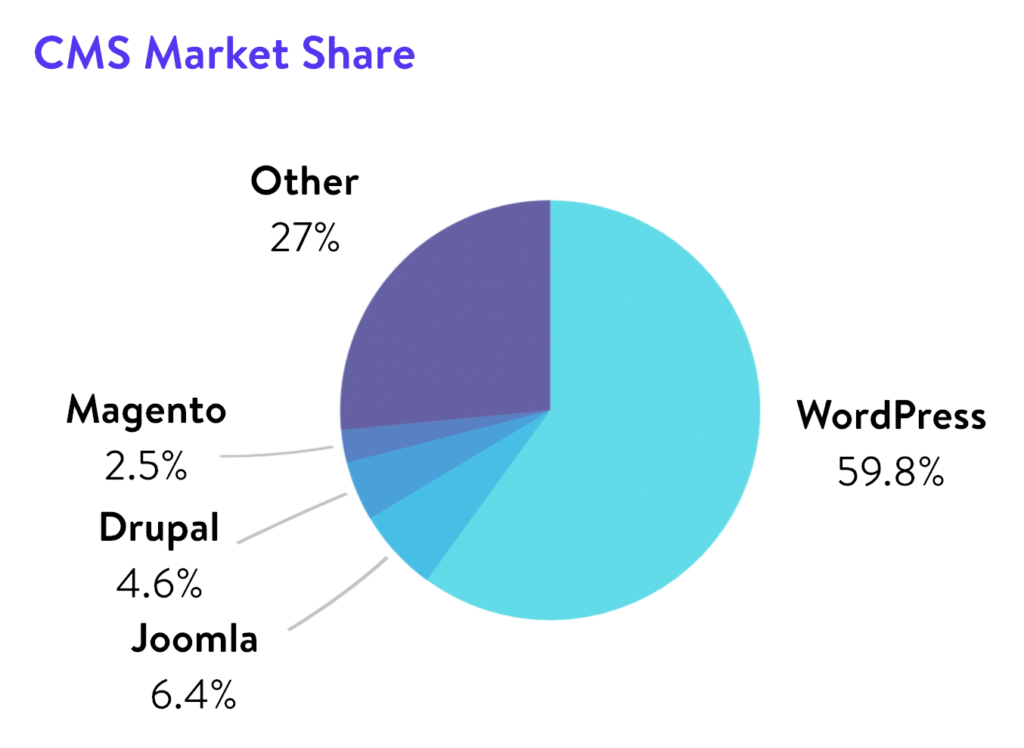
In this article, you will find what is better for your needs Drupal or WordPress.
What is WordPress?
WordPress is a PHP-based open-source content management system that works with either a MySQL or MariaDB database. Plugin architecture and a template system, known as Themes in WordPress.
What is Drupal?
Drupal is a PHP-based free and open-source web content management system licensed under the GNU General Public License. At least 14% of the top 10,000 websites in the world use Drupal as their backend foundation, ranging from personal blogs to business, political, and government sites.
WordPress has the following advantages over Drupal:
- More cost-effective in the long run: WordPress offers more built-in functionality than Drupal, lowering the expense of hiring developers to help them. WordPress developers are also less expensive than Drupal developers.
- The main advantage WordPress has over Drupal is it’s easy to use. For people who are unfamiliar with web programming, WordPress is user-friendly and simple to use.
- Extensive plugins and themes: WordPress offers a ton of plugins and themes, making it simple for an average person to construct a beautiful website without having to hire a developer.
So if you want to use WordPress:
- You want to get a website up and running as quickly as feasible.
- You want to save money as much as possible while yet having the greatest website possible.
- You want to build your own website but have no experience with web development.

Drupal has the following advantages over WordPress:
- Drupal includes a multilingual functionality integrated into its core. WordPress, on the other hand, requires the usage of a third-party plugin.
- Drupal offers one of the most significant security measures available (which is likely many government institutions use them instead). In terms of security, Drupal is also more transparent than WordPress (with frequent security reports).
- Drupal has an integrated control system that provides for sophisticated access controls and user permissions. You may practically create additional roles with separate permissions for each.
- Drupal’s taxonomies are more versatile (refers to how you group related content together). In comparison to WordPress, Drupal is superior at processing massive volumes of data.
So if you want to use Drupal:
- You want to create a website with a sophisticated data structure.
- You’re familiar with web development and willing to code it yourself.
- You’ve set aside a large sum of money to create a Drupal website.
How Many Plugins And Themes Does WordPress Have?
- 60,000+ free plugins, plus thousands of more premium plugins.
- 10,000+ free themes, plus thousands of more premium themes.
How Many Plugins And Themes Does Drupal Have?
- 48,000+ modules
- 3,000+ themes
So, Drupal or WordPress?
It all depends on you. WordPress will always have our support, but we urge you to carefully assess your needs and pick the CMS that will best serve you.
Drupal can be more customizable than WordPress from start, but it does require a lot more work to reach the point where WordPress already has useful features and functionality built in. For both marketing and IT managers, this might mean that larger funds are needed even to meet the most fundamental needs.
We love WordPress for many reasons, one of which being the knowledge that a team of skilled UX designers and developers can invest your money and time in creating the extra functionality, features, and user experiences that you actually require. In contrast, Drupal can satisfy a developer’s demand to start from scratch, which can be a blessing for those with the patience to learn it correctly or a curse for those who don’t.
I hope this article helped you to choose the right CMS Drupal or WordPress.
